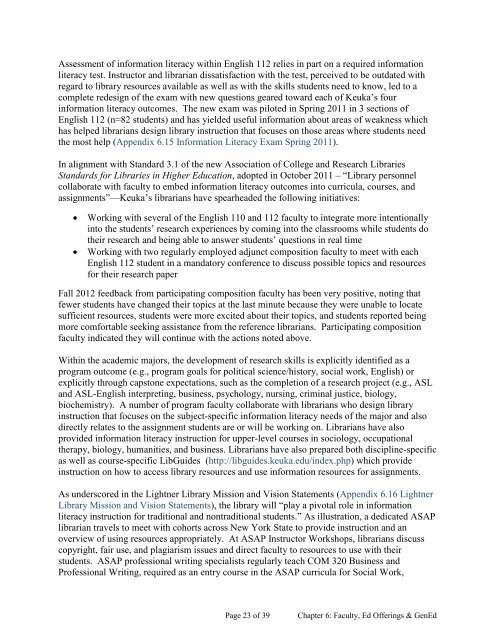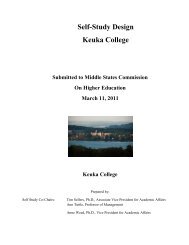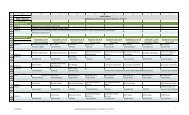final version of the self-study document - Keuka College's Middle ...
final version of the self-study document - Keuka College's Middle ...
final version of the self-study document - Keuka College's Middle ...
You also want an ePaper? Increase the reach of your titles
YUMPU automatically turns print PDFs into web optimized ePapers that Google loves.
Assessment <strong>of</strong> information literacy within English 112 relies in part on a required information<br />
literacy test. Instructor and librarian dissatisfaction with <strong>the</strong> test, perceived to be outdated with<br />
regard to library resources available as well as with <strong>the</strong> skills students need to know, led to a<br />
complete redesign <strong>of</strong> <strong>the</strong> exam with new questions geared toward each <strong>of</strong> <strong>Keuka</strong>’s four<br />
information literacy outcomes. The new exam was piloted in Spring 2011 in 3 sections <strong>of</strong><br />
English 112 (n=82 students) and has yielded useful information about areas <strong>of</strong> weakness which<br />
has helped librarians design library instruction that focuses on those areas where students need<br />
<strong>the</strong> most help (Appendix 6.15 Information Literacy Exam Spring 2011).<br />
In alignment with Standard 3.1 <strong>of</strong> <strong>the</strong> new Association <strong>of</strong> College and Research Libraries<br />
Standards for Libraries in Higher Education, adopted in October 2011 – “Library personnel<br />
collaborate with faculty to embed information literacy outcomes into curricula, courses, and<br />
assignments”—<strong>Keuka</strong>’s librarians have spearheaded <strong>the</strong> following initiatives:<br />
Working with several <strong>of</strong> <strong>the</strong> English 110 and 112 faculty to integrate more intentionally<br />
into <strong>the</strong> students’ research experiences by coming into <strong>the</strong> classrooms while students do<br />
<strong>the</strong>ir research and being able to answer students’ questions in real time<br />
Working with two regularly employed adjunct composition faculty to meet with each<br />
English 112 student in a mandatory conference to discuss possible topics and resources<br />
for <strong>the</strong>ir research paper<br />
Fall 2012 feedback from participating composition faculty has been very positive, noting that<br />
fewer students have changed <strong>the</strong>ir topics at <strong>the</strong> last minute because <strong>the</strong>y were unable to locate<br />
sufficient resources, students were more excited about <strong>the</strong>ir topics, and students reported being<br />
more comfortable seeking assistance from <strong>the</strong> reference librarians. Participating composition<br />
faculty indicated <strong>the</strong>y will continue with <strong>the</strong> actions noted above.<br />
Within <strong>the</strong> academic majors, <strong>the</strong> development <strong>of</strong> research skills is explicitly identified as a<br />
program outcome (e.g., program goals for political science/history, social work, English) or<br />
explicitly through capstone expectations, such as <strong>the</strong> completion <strong>of</strong> a research project (e.g., ASL<br />
and ASL-English interpreting, business, psychology, nursing, criminal justice, biology,<br />
biochemistry). A number <strong>of</strong> program faculty collaborate with librarians who design library<br />
instruction that focuses on <strong>the</strong> subject-specific information literacy needs <strong>of</strong> <strong>the</strong> major and also<br />
directly relates to <strong>the</strong> assignment students are or will be working on. Librarians have also<br />
provided information literacy instruction for upper-level courses in sociology, occupational<br />
<strong>the</strong>rapy, biology, humanities, and business. Librarians have also prepared both discipline-specific<br />
as well as course-specific LibGuides (http://libguides.keuka.edu/index.php) which provide<br />
instruction on how to access library resources and use information resources for assignments.<br />
As underscored in <strong>the</strong> Lightner Library Mission and Vision Statements (Appendix 6.16 Lightner<br />
Library Mission and Vision Statements), <strong>the</strong> library will “play a pivotal role in information<br />
literacy instruction for traditional and nontraditional students.” As illustration, a dedicated ASAP<br />
librarian travels to meet with cohorts across New York State to provide instruction and an<br />
overview <strong>of</strong> using resources appropriately. At ASAP Instructor Workshops, librarians discuss<br />
copyright, fair use, and plagiarism issues and direct faculty to resources to use with <strong>the</strong>ir<br />
students. ASAP pr<strong>of</strong>essional writing specialists regularly teach COM 320 Business and<br />
Pr<strong>of</strong>essional Writing, required as an entry course in <strong>the</strong> ASAP curricula for Social Work,<br />
Page 23 <strong>of</strong> 39 Chapter 6: Faculty, Ed Offerings & GenEd




